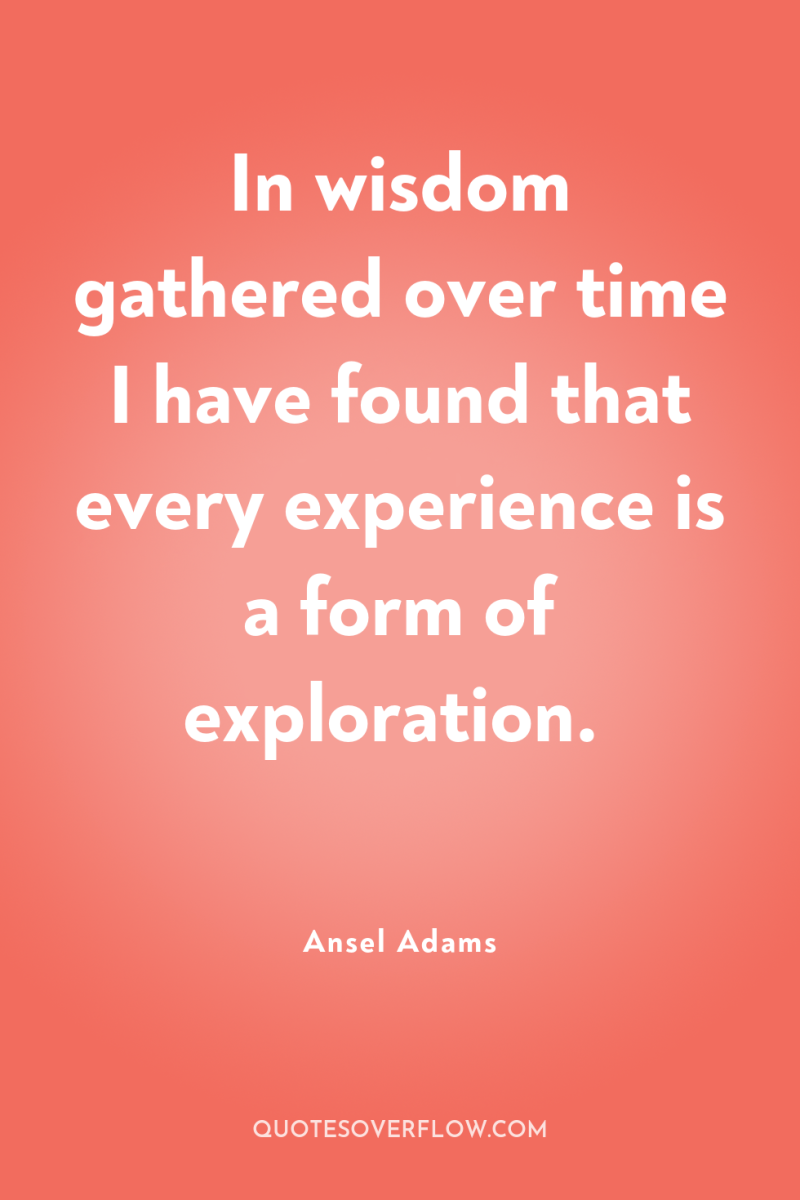
1
In wisdom gathered over time I have found that every experience is a form of exploration.Ansel Adams
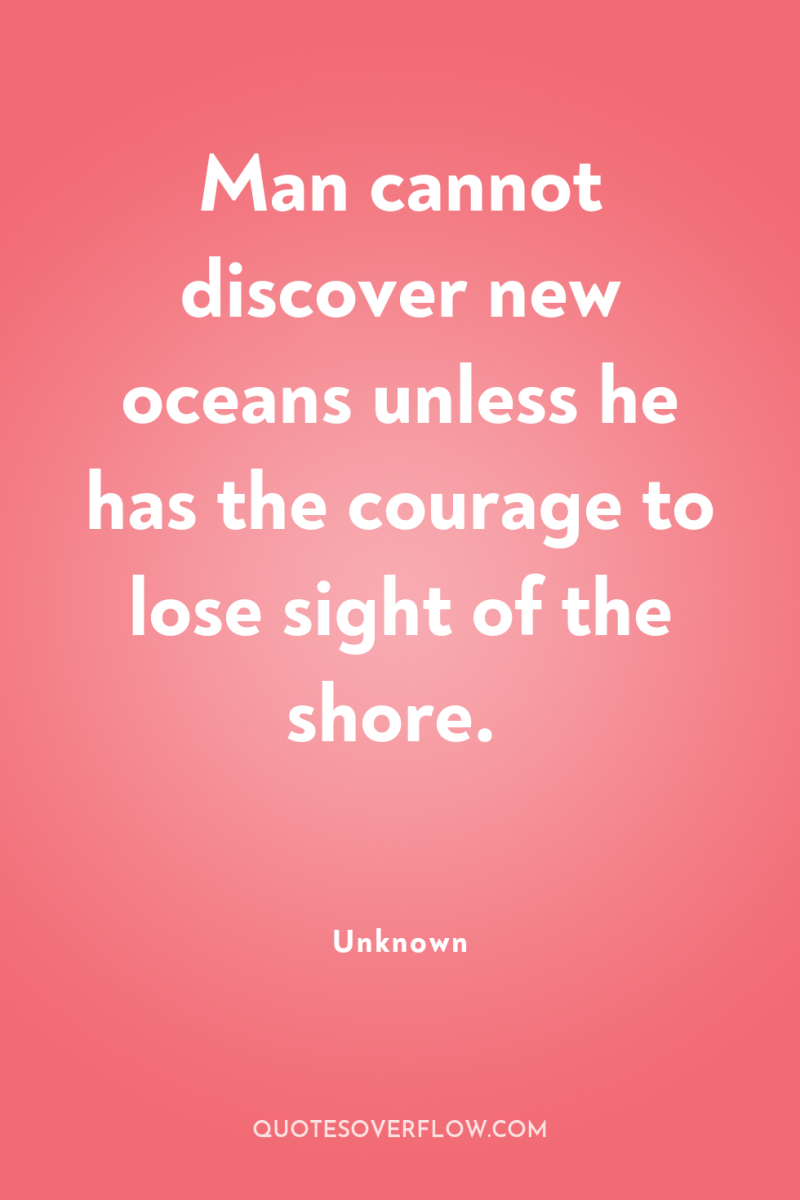
2
Man cannot discover new oceans unless he has the courage to lose sight of the shore.Unknown
3
We can't be afraid of change. You may feel very secure in the pond that you are in, but if you never venture out of it, you will never know that there is such a thing as an ocean, a sea. Holding onto something that is good for you now, may be the very reason why you don't have something better.C. Joybell C.

4
I enjoy melancholic music and art. They take me to places I don't normally get to go.Criss Jami

5
When a Wanderess has been caged, or perched with her wings clipped, She lives like a Stoic, She lives most heroic, smiling with ruby, moistened lips once her cup of Death is welcome sipped.Roman Payne

6
A woman must prefer her liberty over a man. To be happy, she must. A man to be happy, however, must yearn for his woman more than his liberty. This is the rightful order.Roman Payne
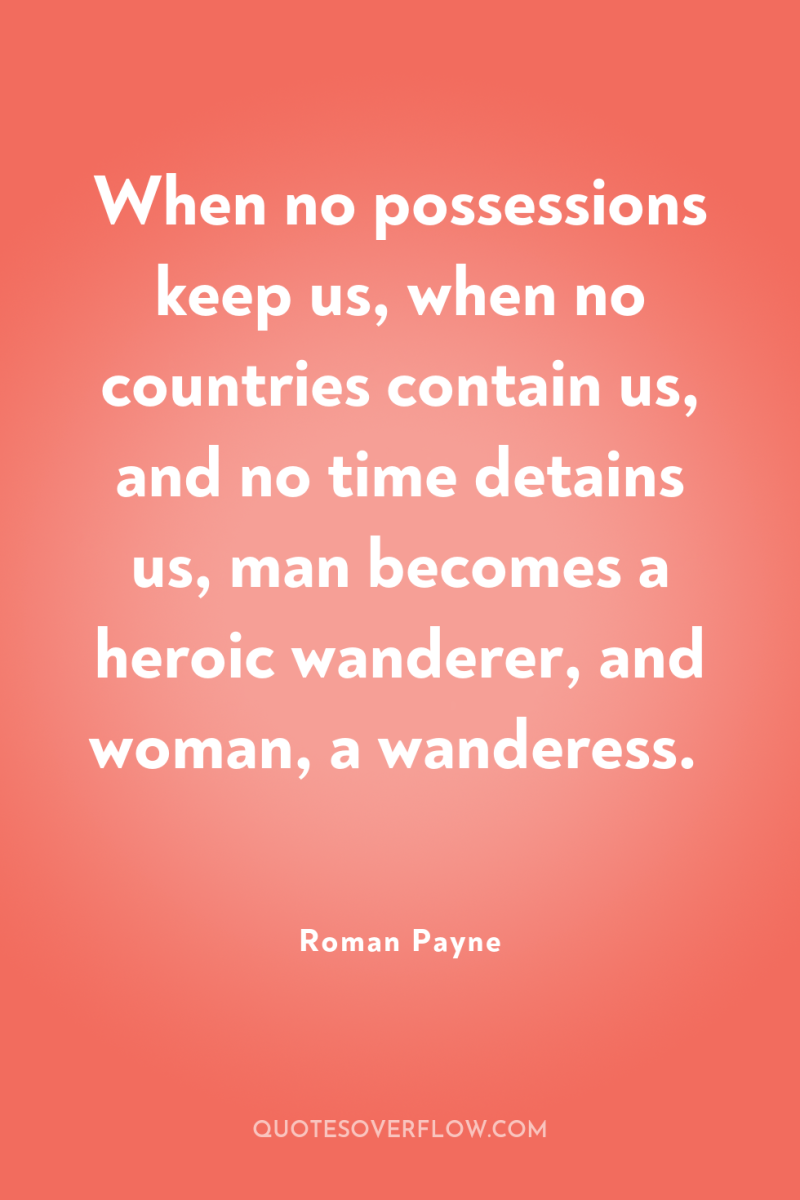
7
When no possessions keep us, when no countries contain us, and no time detains us, man becomes a heroic wanderer, and woman, a wanderess.Roman Payne
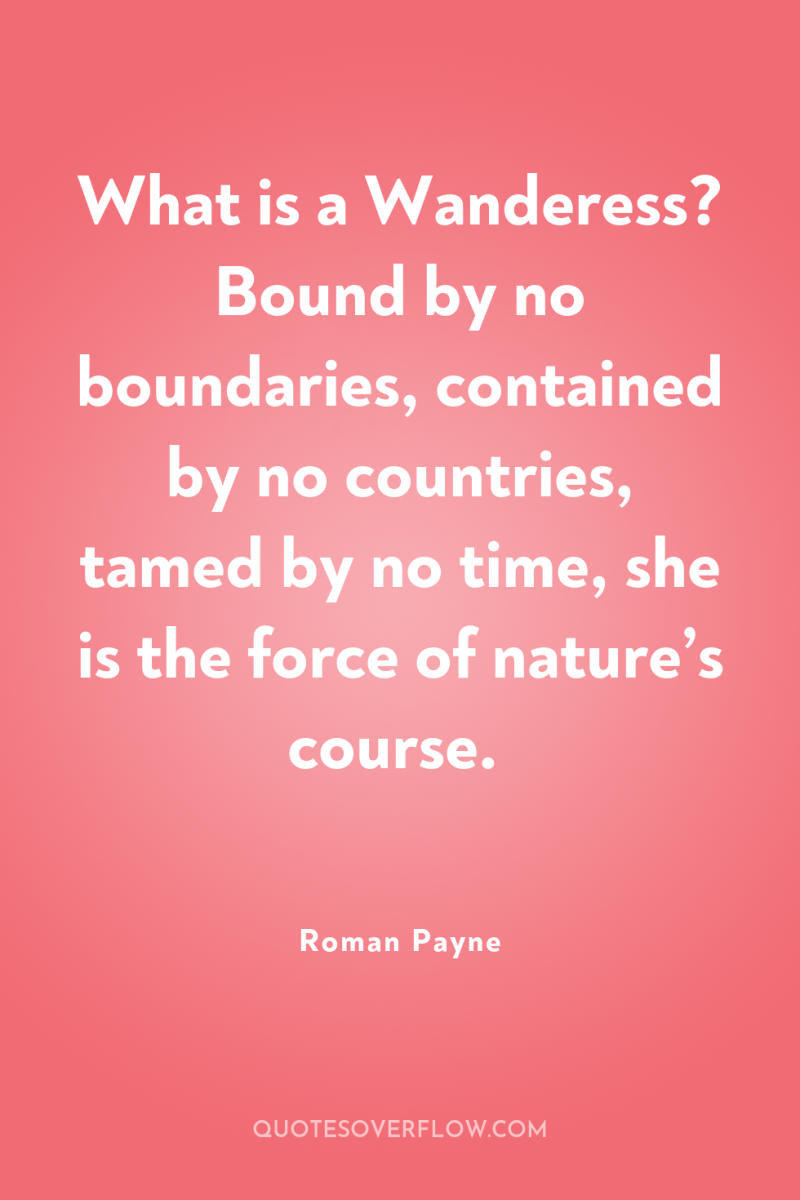
8
What is a Wanderess? Bound by no boundaries, contained by no countries, tamed by no time, she is the force of nature’s course.Roman Payne
9
It seemed to me an odd view to take - rather as if one should protest that one didn't LIKE the idea of dying or being born. I preferred the notion of finding out first how it would be, and then doing what one could about the parts of it one disliked most.John Wyndham
10
A story is not like a road to follow … it's more like a house. You go inside and stay there for a while, wandering back and forth and settling where you like and discovering how the room and corridors relate to each other, how the world outside is altered by being viewed from these windows. And you, the visitor, the reader, are altered as well by being in this enclosed space, whether it is ample and easy or full of crooked turns, or sparsely or opulently furnished. You can go back again and again, and the house, the story, always contains more than you saw the last time. It also has a sturdy sense of itself of being built out of its own necessity, not just to shelter or beguile you.Alice Munro
11
Scent is such a powerful tool of attraction, that if a woman has this tool perfectly tuned, she needs no other. I will forgive her a large nose, a cleft lip, even crossed-eyes; and I’ll bathe in the jouissance of her intoxicating odour.Roman Payne
12
I’d loved women who were old and who were young; those extra kilos and large rumps, and others so thin there was barely even skin to pinch, and every time I held them, I worried I would snap them in two. But for all of these: where they had merited my love was in their delicious smell. Scent is such a powerful tool of attraction, that if a woman has this tool perfectly tuned, she needs no other. I will forgive her a large nose, a cleft lip, even crossed-eyes; and I’ll bathe in the jouissance of her intoxicating odour. .Roman Payne
13
The known is finite, the unknown is infinite; intellectually we stand on an islet in the midst of an illimitable ocean of inexplicability. Our business in every generation is to claim a little more land.T. H. Huxley
14
On building homes for fallen angels: When I was small - I sought a home, a place to go and rest my bones. Then founded something, of my own, I lived among the restless stones. If seeking leads you back to evil, what good is that, I asked a weevil. He said a home is what you make, it can't be real, if it is fake.. And if you wait instead of seek, will you find love, or something bleak? I know (myself) for I have found, a beauty, hidden — in a sound. Waiting is boring. And so is exploring. A smile is sometimes all it takes. And then your whole world simply breaks.Will Advise
15
I wonder if more students would do better in elementary and high school if teachers taught more about individual exploration of subjects and less about sliding smoothly along observational ruts. Exploration is a liberal art, because it is an art that liberates, that frees, that opens away from narrowness. And it is fun.John R. Stilgoe
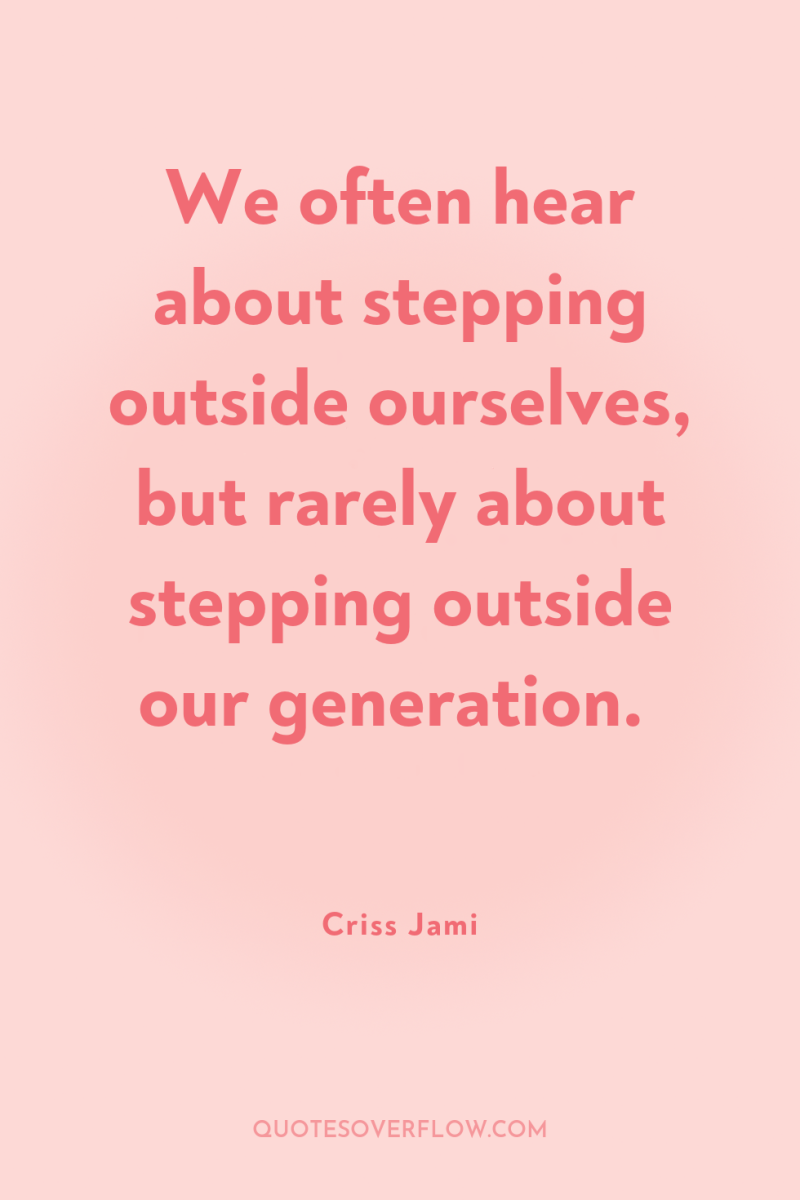
16
We often hear about stepping outside ourselves, but rarely about stepping outside our generation.Criss Jami

17
Whatever territory you choose to explore and then invest all your time into it, you will be amazed how easy it is to become great.Sunday Adelaja
18
The Cosmos extends, for all practical purposes, forever. After a brief sedentary hiatus, we are resuming our ancient nomadic way of life. Our remote descendants, safely arrayed on many worlds throughout the Solar System and beyond, will be unified by their common heritage, by their regard for their home planet, and by the knowledge that, whatever other life may be, the only humans in all the Universe come from Earth. They will gaze up and strain to find the blue dot in their skies. They will love it no less for its obscurity and fragility. They will marvel at how vulnerable the repository of all our potential once was, how perilous our infancy, how humble our beginnings, how many rivers we had to cross before we found our way.Carl Sagan
19
If and when all the laws governing physical phenomena are finally discovered, and all the empirical constants occurring in these laws are finally expressed through the four independent basic constants, we will be able to say that physical science has reached its end, that no excitement is left in further explorations, and that all that remains to a physicist is either tedious work on minor details or the self-educational study and adoration of the magnificence of the completed system. At that stage physical science will enter from the epoch of Columbus and Magellan into the epoch of the National Geographic Magazine! .George Gamow
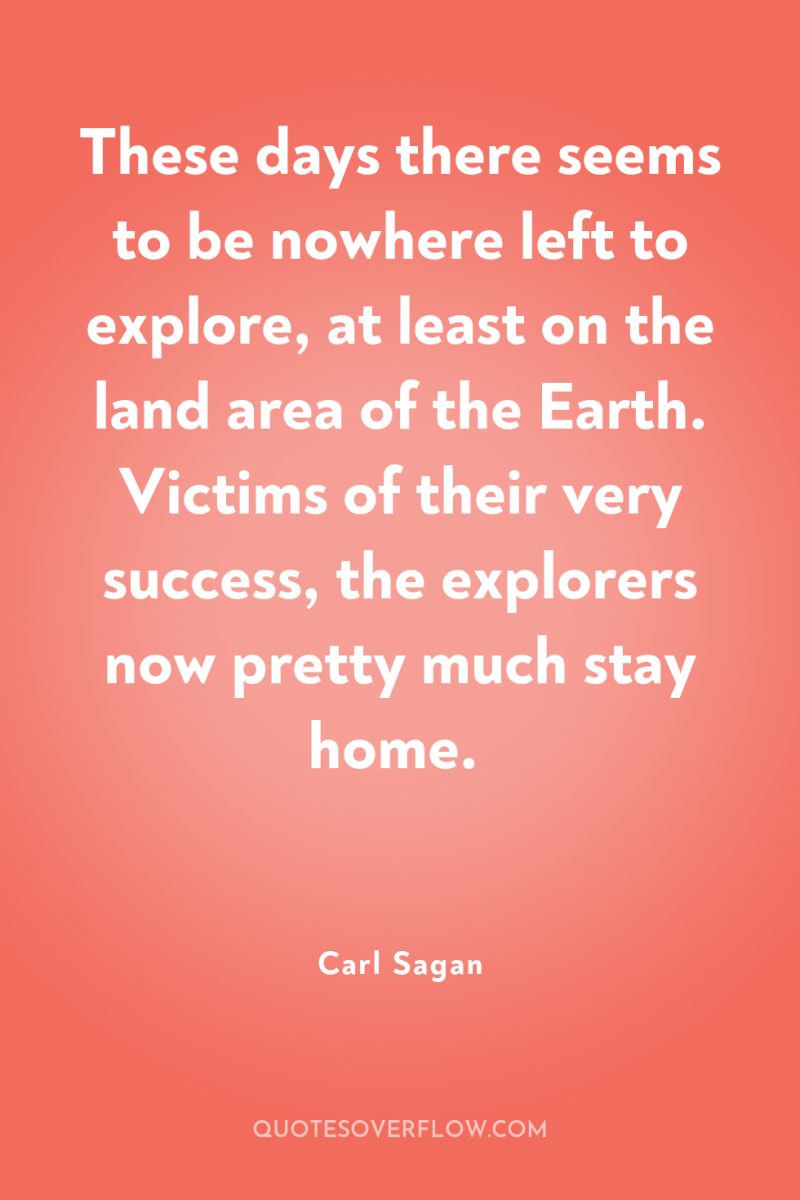
20
These days there seems to be nowhere left to explore, at least on the land area of the Earth. Victims of their very success, the explorers now pretty much stay home.Carl Sagan
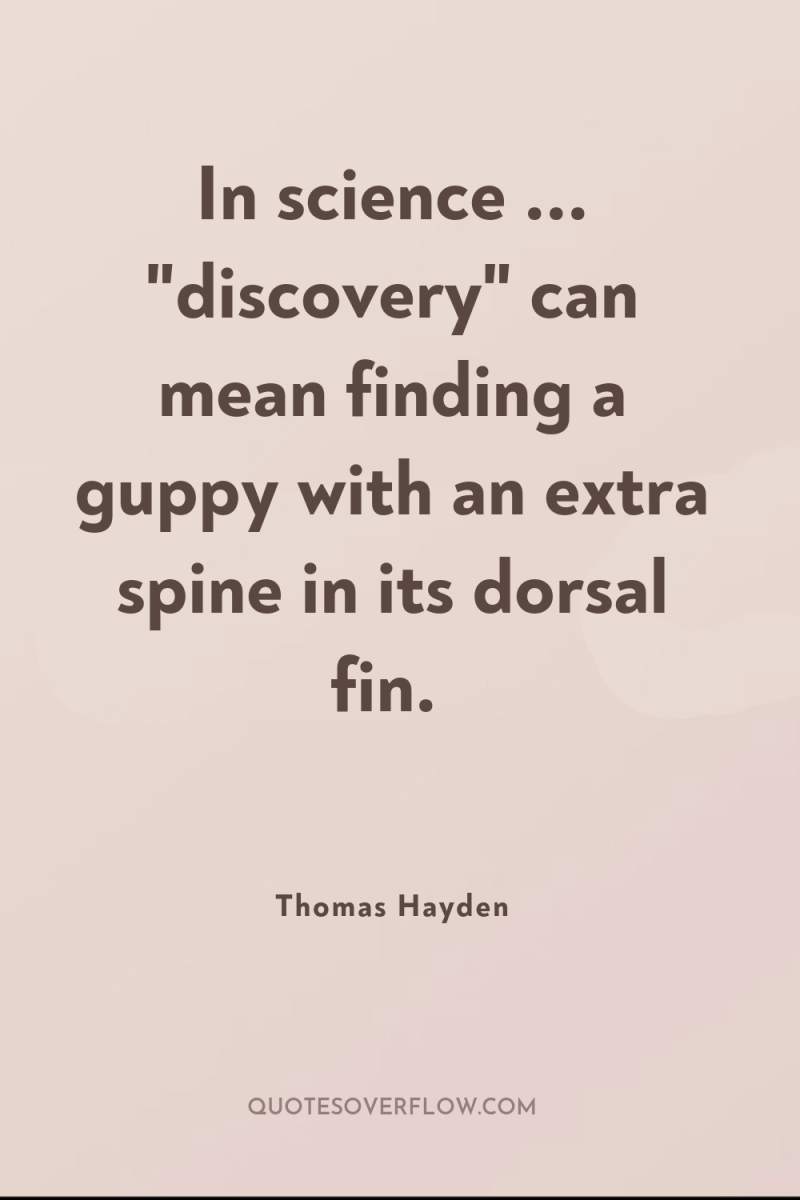
21
In science ... "discovery" can mean finding a guppy with an extra spine in its dorsal fin.Thomas Hayden
22
We tend to hear much more about the splendors returned than the ships that brought them or the shipwrights. It has always been that way. Even those history books enamored of the voyages of Christopher Columbus do not tell much about the builders of the Nina the Pinta and the Santa Maria or about the principle of the caravel. These spacecraft their designers builders navigators and controllers are examples of what science and engineering set free for well-defined peaceful purposes can accomplish. Those scientists and engineers should be role models for an America seeking excellence and international competitiveness. They should be on our stamps.Carl Sagan
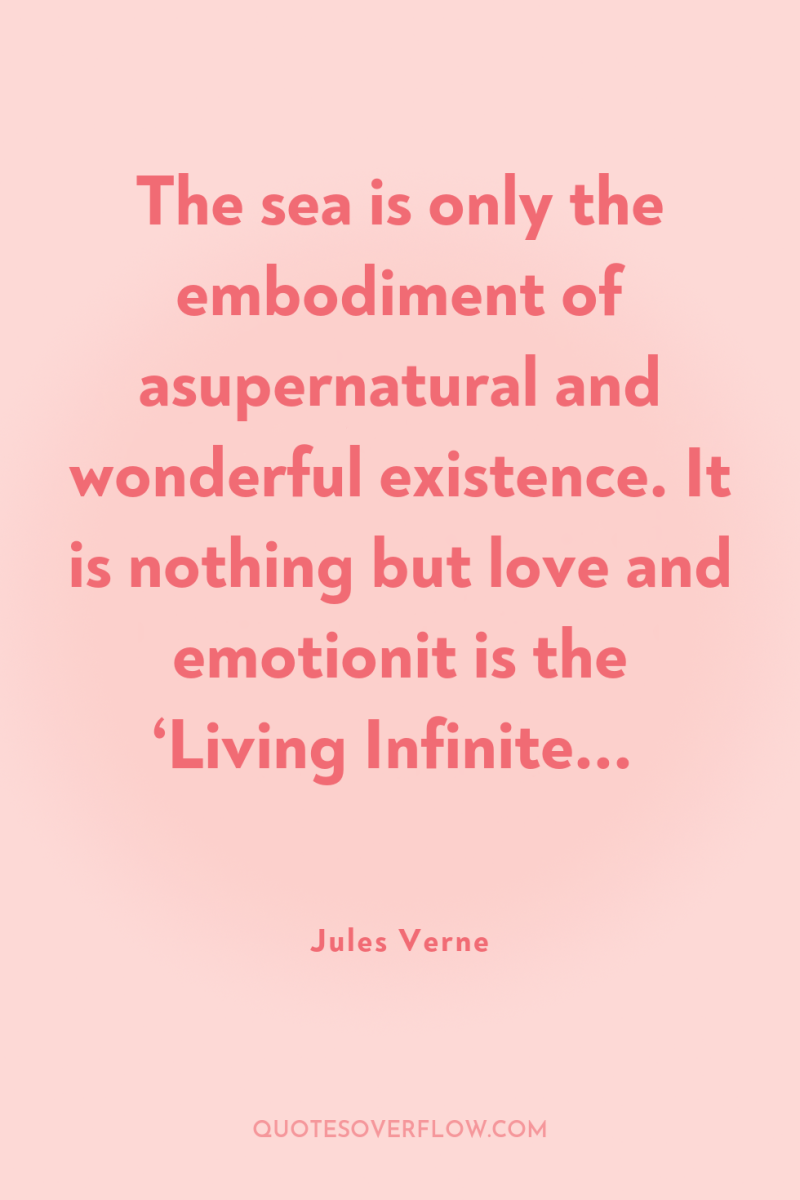
23
The sea is only the embodiment of asupernatural and wonderful existence. It is nothing but love and emotionit is the ‘Living Infinite...Jules Verne
24
People have always looked to the horizon and feared that which they did not understand. Initially, this horizon was the edge of the forest. Then, when forests became better explored and their dangers were realized as not actually being that serious, human attention turned toward the darkness of the sea. Then the sea became better explored, and the new horizon became the vastness of space. And now, with space getting ever better explored, a new horizon appears. in the form of the horrors humanity is about to unleash on itself. .Matt Kaplan
25
The elasticity of our dreams can take us to unspoken worlds, but our innate horror of the unknown is what weighs us down. Fight it. Travel to the isolated coils of smoldering dust trapped in our dusky sky or explore the unseen timeless vibration of dancing particles that fashions existence. Whatever choice you make can change your life forever. The same applies to a story. Words are the atoms of a tale, and together they compose a universe.H.S. Crow
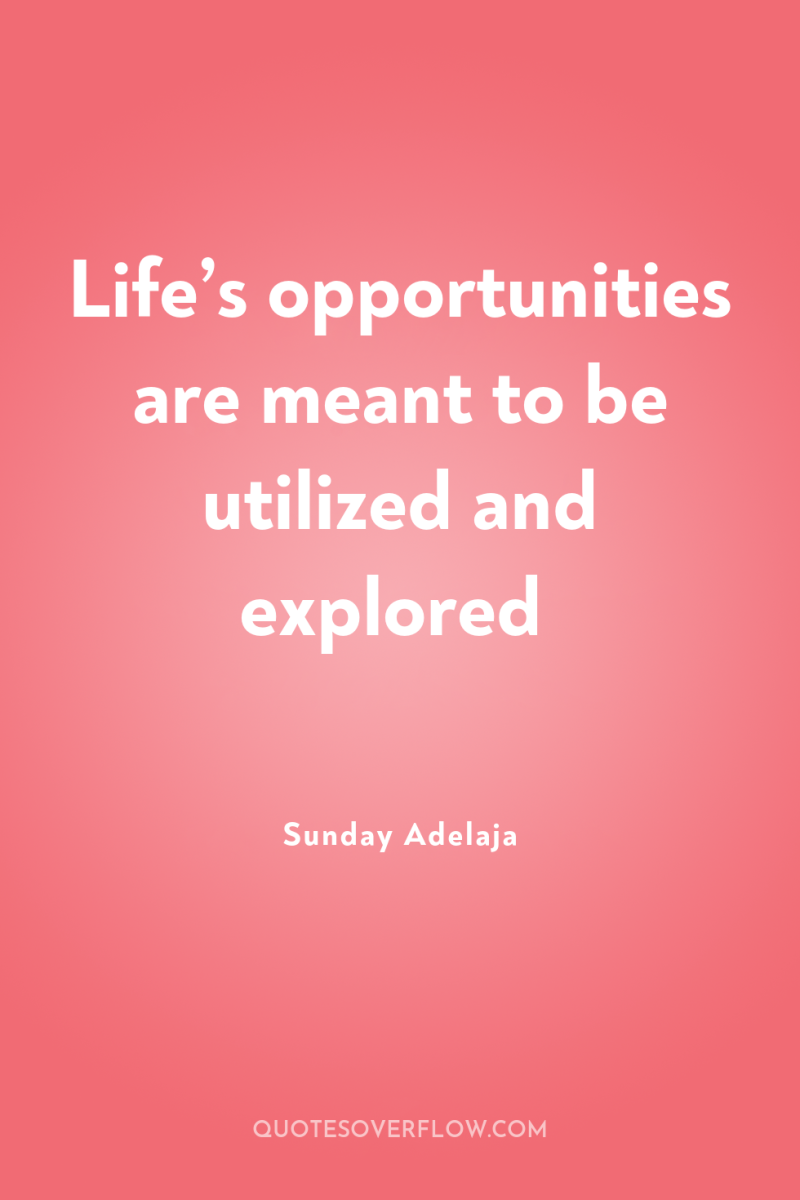
26
Life’s opportunities are meant to be utilized and exploredSunday Adelaja

27
Ô, the wine of a woman from heaven is sent, more perfect than all that a man can invent.Roman Payne
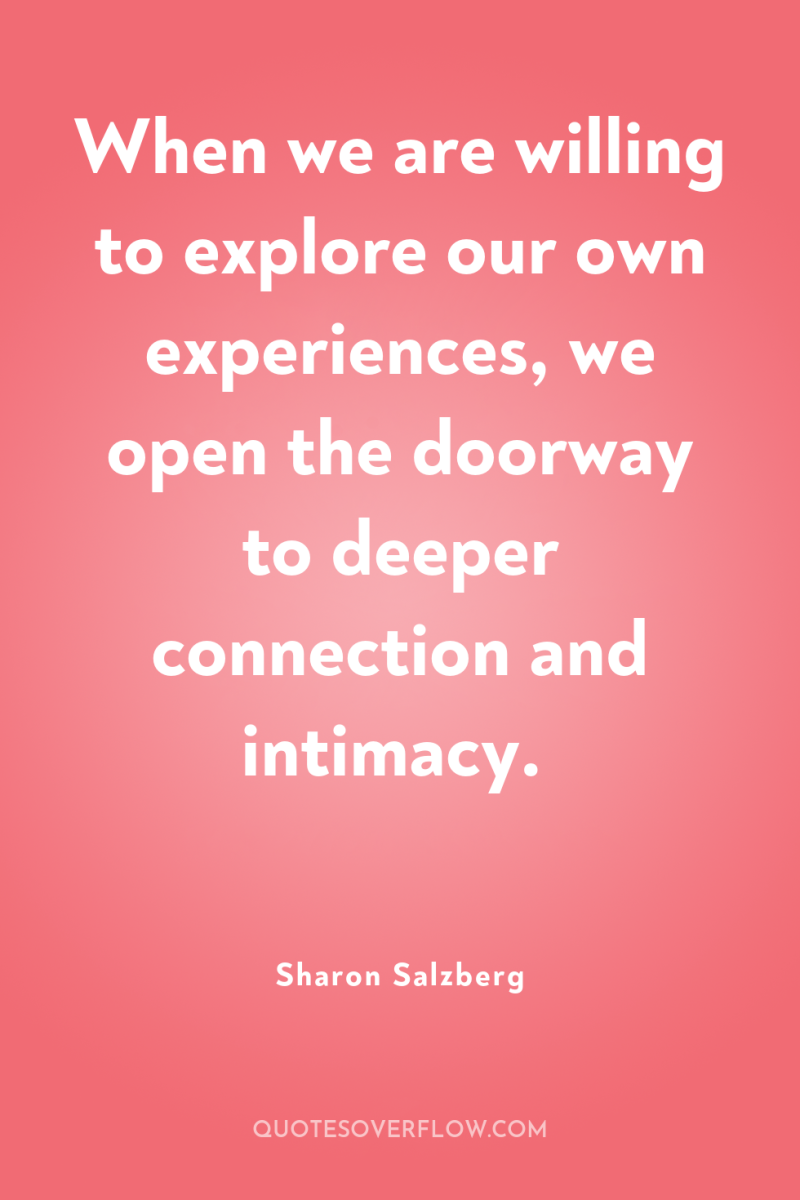
28
When we are willing to explore our own experiences, we open the doorway to deeper connection and intimacy.Sharon Salzberg
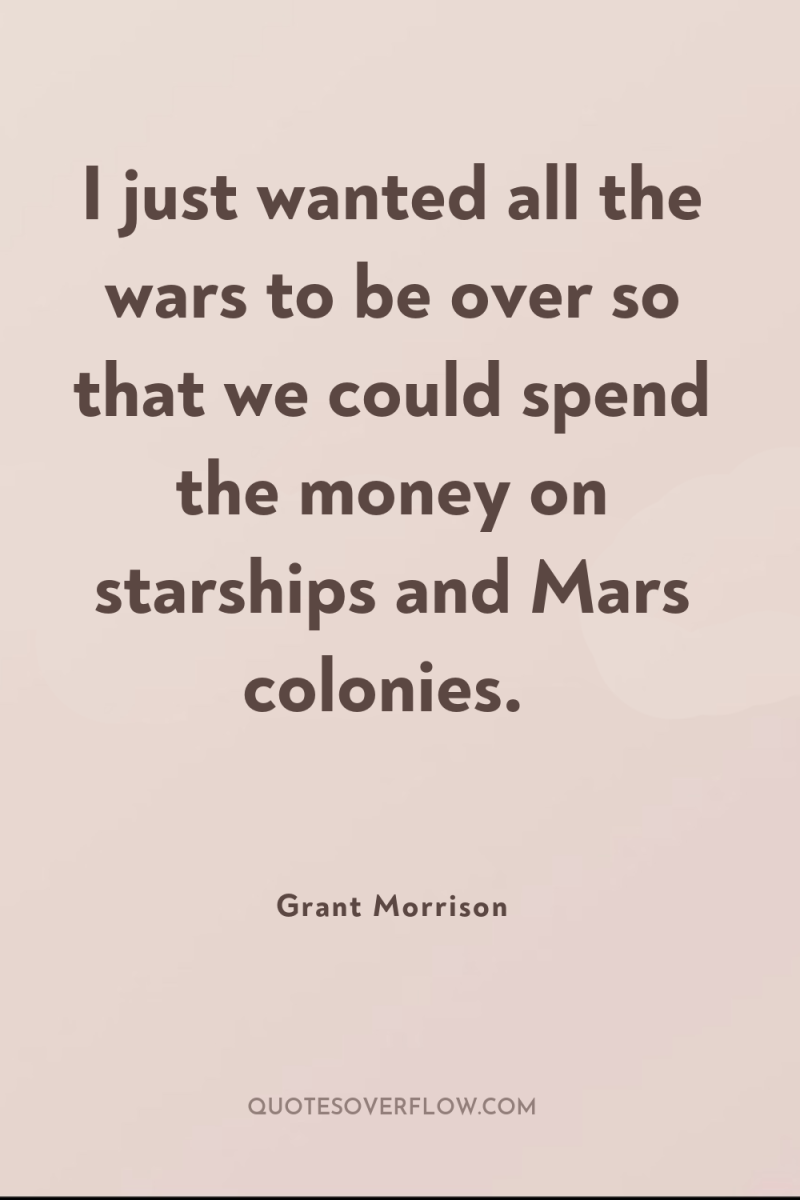
29
I just wanted all the wars to be over so that we could spend the money on starships and Mars colonies.Grant Morrison
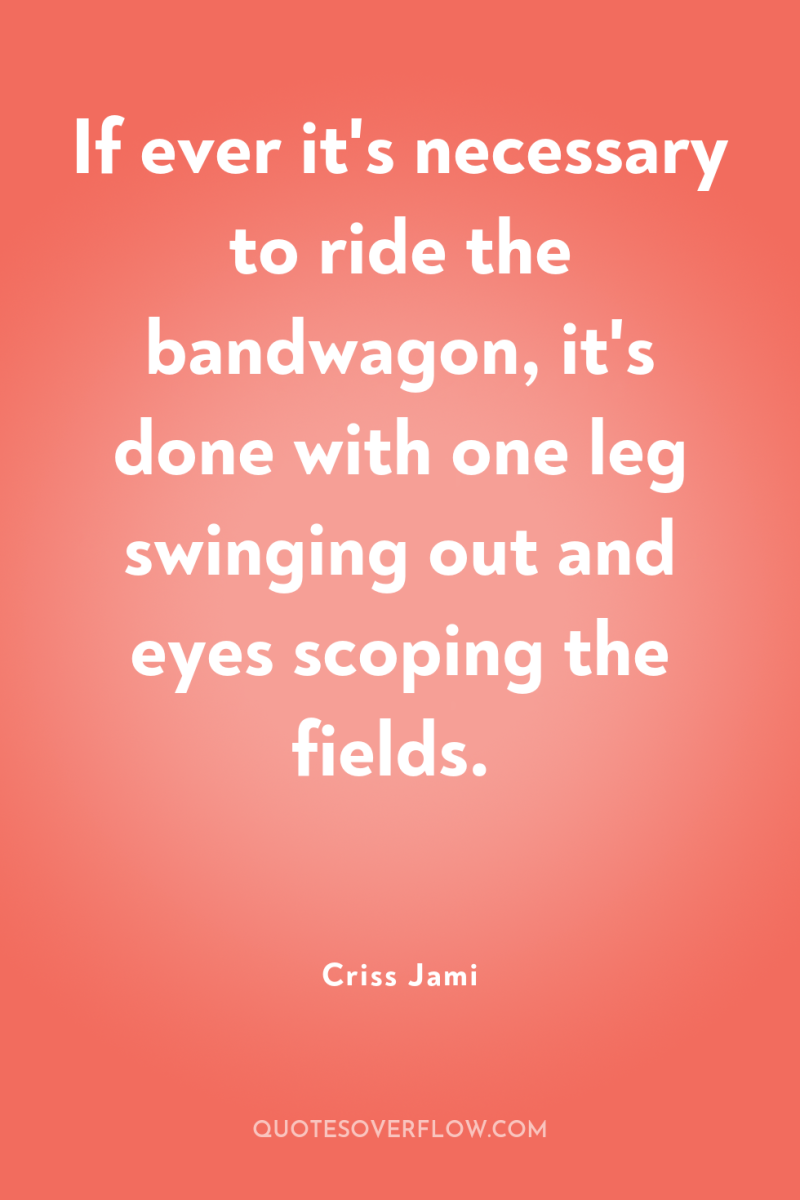
30
If ever it's necessary to ride the bandwagon, it's done with one leg swinging out and eyes scoping the fields.Criss Jami
31
The beauty of Mars exists in the human mind, ” he said in that dry factual tone, and everyone stared at him amazed. “Without the human presence it is just a collection of atoms, no different than any other random speck of matter in the universe. It’s we who understand it, and we who give it meaning. All our centuries of looking up at the night sky and watching it wander through the stars. All those nights of watching it through the telescopes, looking at a tiny disk trying to see canals in the albedo changes. All those dumb sci-fi novels with their monsters and maidens and dying civilizations. And all the scientists who studied the data, or got us here. That’s what makes Mars beautiful. Not the basalt and the oxides .Kim Stanley Robinson
32
A kind of northing is what I wish to accomplish, a single-minded trek towards that place where any shutter left open to the zenith at night will record the wheeling of all the sky’s stars as a pattern of perfect, concentric circles. I seek a reduction, a shedding, a sloughing off. At the seashore you often see a shell, or fragment of a shell, that sharp sands and surf have thinned to a wisp. There is no way you can tell what kind of shell it had been, what creature it had housed; it could have been a whelk or a scallop, a cowrie, limpet, or conch. The animal is long since dissolved, and its blood spread and thinned in the general sea. All you hold in your hand is a cool shred of shell, an inch long, pared so thin that it passes a faint pink light. It is an essence, a smooth condensation of the air, a curve. I long for the North where unimpeded winds would hone me to such a pure slip of bone. But I’ll not go northing this year. I’ll stalk that floating pole and frigid air by waiting here. I wait on bridges; I wait, struck, on forest paths and meadow’s fringes, hilltops and banksides, day in and day out, and I receive a southing as a gift. The North washes down the mountains like a waterfall, like a tidal wave, and pours across the valley; it comes to me. It sweetens the persimmons and numbs the last of the crickets and hornets; it fans the flames of the forest maples, bows the meadow’s seeded grasses and pokes it chilling fingers under the leaf litter, thrusting the springtails and the earthworms deeper into the earth. The sun heaves to the south by day, and at night wild Orion emerges looming like the Specter over Dead Man Mountain. Something is already here, and more is coming.Annie Dillard
33
I have often noticed that these things, which obsess me, neither bother nor impress other people even slightly. I am horribly apt to approach some innocent at a gathering, and like the ancient mariner, fix him with a wild, glitt’ring eye and say, “Do you know that in the head of the caterpillar of the ordinary goat moth there are two hundred twenty-eight separate muscles?” The poor wretch flees. I am not making chatter; I mean to change his life.Annie Dillard
34
All at once, something wonderful happened, although at first, it seemed perfectly ordinary. A female goldfinch suddenly hove into view. She lighted weightlessly on the head of a bankside purple thistle and began emptying the seedcase, sowing the air with down. The lighted frame of my window filled. The down rose and spread in all directions, wafting over the dam’s waterfall and wavering between the tulip trunks and into the meadow. It vaulted towards the orchard in a puff; it hovered over the ripening pawpaw fruit and staggered up the steep faced terrace. It jerked, floated, rolled, veered, swayed. The thistle down faltered down toward the cottage and gusted clear to the woods; it rose and entered the shaggy arms of pecans. At last it strayed like snow, blind and sweet, into the pool of the creek upstream, and into the race of the creek over rocks down. It shuddered onto the tips of growing grasses, where it poised, light, still wracked by errant quivers. I was holding my breath. Is this where we live, I thought, in this place in this moment, with the air so light and wild? The same fixity that collapses stars and drives the mantis to devour her mate eased these creatures together before my eyes: the thick adept bill of the goldfinch, and the feathery coded down. How could anything be amiss? If I myself were lighter and frayed, I could ride these small winds, too, taking my chances, for the pleasure of being so purely played. The thistle is part of Adam’s curse. “Cursed is the ground for thy sake, in sorrow shalt thou eat of it; thorns also and thistles shall it bring forth to thee.” A terrible curse: But does the goldfinch eat thorny sorrow with the thistle or do I? If this furling air is fallen, then the fall was happy indeed. If this creekside garden is sorrow, then I seek martyrdom. I was weightless; my bones were taut skins blown with buoyant gas; it seemed that if I inhaled too deeply, my shoulders and head would waft off. Alleluia. .Annie Dillard
35
Today is the winter solstice. The planet tilts just so to its star, lists and holds circling in a fixed tension between veering and longing, and spins helpless, exalted, in and out of that fleet blazing touch. Last night Orion vaulted and spread all over the sky, pagan and lunatic, his shoulder and knee on fire, his sword three suns at the ready-for what? I won’t see this year again, not again so innocent; and longing wrapped round my throat like a scarf. “For the Heavenly Father desires that we should see, ” says Ruysbroeck, “and that is why He is ever saying to our inmost spirit one deep unfathomable word and nothing else.” But what is the word? Is this mystery or coyness? A cast-iron bell hung from the arch of my rib cage; when I stirred, it rang, or it tolled, a long syllable pulsing ripples up my lungs and down the gritty sap inside my bones, and I couldn’t make it out; I felt the voiced vowel like a sigh or a note but I couldn’t catch the consonant that shaped it into sense. .Annie Dillard
36
In the forty minutes I watched the muskrat, he never saw me, smelled me, or heard me at all. When he was in full view of course I never moved except to breathe. My eyes would move, too, following his, but he never noticed. Only once, when he was feeding from the opposite bank about eight feet away did he suddenly rise upright, all alert- and then he immediately resumed foraging. But he never knew I was there. I never knew I was there, either. For that forty minutes last night I was as purely sensitive and mute as a photographic plate; I received impressions, but I did not print out captions. My own self-awareness had disappeared; it seems now almost as though, had I been wired to electrodes, my EEG would have been flat. I have done this sort of thing so often that I have lost self-consciousness about moving slowly and halting suddenly. And I have often noticed that even a few minutes of this self-forgetfulness is tremendously invigorating. I wonder if we do not waste most of our energy just by spending every waking minute saying hello to ourselves. Martin Buber quotes an old Hasid master who said, “When you walk across the field with your mind pure and holy, then from all the stones, and all growing things, and all animals, the sparks of their souls come out and cling to you, and then they are purified and become a holy fire in you.Annie Dillard
37
The color-patches of vision part, shift, and reform as I move through space in time. The present is the object of vision, and what I see before me at any given second is a full field of color patches scattered just so. The configuration will never be repeated. Living is moving; time is a live creek bearing changing lights. As I move, or as the world moves around me, the fullness of what I see shatters. “Last forever! ” Who hasn’t prayed that prayer? You were lucky to get it in the first place. The present is a freely given canvas. That it is constantly being ripped apart and washed downstream goes without saying; it is a canvas, nevertheless. But there is more to the present than a series of snapshots. We are not merely sensitized film; we have feelings, a memory for information and an eidetic memory for the imagery of our pasts. Our layered consciousness is a tiered track for an unmatched assortment of concentrically wound reels. Each one plays out for all of life its dazzle and blur of translucent shadow-pictures; each one hums at every moment its own secret melody in its own unique key. We tune in and out. But moments are not lost. Time out of mind is time nevertheless, cumulative, informing the present. From even the deepest slumber you wake with a jolt- older, closer to death, and wiser, grateful for breath. But time is the one thing we have been given, and we have been given to time. Time gives us a whirl. We keep waking from a dream we can’t recall, looking around in surprise, and lapsing back, for years on end. All I want to do is stay awake, keep my head up, prop my eyes open, with toothpicks, with trees.Annie Dillard
38
Xerxes, I read, ‘halted his unwieldy army for days that he might contemplate to his satisfaction’ the beauty of a single sycamore. You are Xerxes in Persia. Your army spreads on a vast and arid peneplain…you call to you all your sad captains, and give the order to halt. You have seen the tree with the lights in it, haven’t you? You must have. Xerxes buffeted on a plain, ambition drained in a puff. Your men are bewildered…there is nothing to catch the eye in this flatness, nothing but a hollow, hammering sky, a waste of sedge in the lee of windblown rocks, a meager ribbon of scrub willow tracing a slumbering watercourse…and that sycamore. You saw it; you will stand rapt and mute, exalted, remembering or not remembering over a period of days to shade your head with your robe. “He had its form wrought upon a medal of gold to help him remember it the rest of his life.” We all ought to have a goldsmith following us around. But it goes without saying, doesn’t it, Xerxes, that no gold medal worn around your neck will bring back the glad hour, keep those lights kindled so long as you live, forever present? Pascal saw it; he grabbed pen and paper and scrawled the one word, and wore it sewn in his shirt the rest of his life. I don’t know what Pascal saw. I saw a cedar. Xerxes saw a sycamore.Annie Dillard
39
And under the cicadas, deeper down that the longest taproot, between and beneath the rounded black rocks and slanting slabs of sandstone in the earth, ground water is creeping. Ground water seeps and slides, across and down, across and down, leaking from here to there, minutely at a rate of a mile a year. What a tug of waters goes on! There are flings and pulls in every direction at every moment. The world is a wild wrestle under the grass; earth shall be moved. What else is going on right this minute while ground water creeps under my feet? The galaxy is careening in a slow, muffled widening. If a million solar systems are born every hour, then surely hundreds burst into being as I shift my weight to the other elbow. The sun’s surface is now exploding; other stars implode and vanish, heavy and black, out of sight. Meteorites are arcing to earth invisibly all day long. On the planet, the winds are blowing: the polar easterlies, the westerlies, the northeast and southeast trades. Somewhere, someone under full sail is becalmed, in the horse latitudes, in the doldrums; in the northland, a trapper is maddened, crazed, by the eerie scent of the chinook, the sweater, a wind that can melt two feet of snow in a day. The pampero blows, and the tramontane, and the Boro, sirocco, levanter, mistral. Lick a finger; feel the now. Spring is seeping north, towards me and away from me, at sixteen miles a day. Along estuary banks of tidal rivers all over the world, snails in black clusters like currants are gliding up and down the stems of reed and sedge, migrating every moment with the dip and swing of tides. Behind me, Tinker Mountain is eroding one thousandth of an inch a year. The sharks I saw are roving up and down the coast. If the sharks cease roving, if they still their twist and rest for a moment, they die. They need new water pushed into their gills; they need dance. Somewhere east of me, on another continent, it is sunset, and starlings in breathtaking bands are winding high in the sky to their evening roost. The mantis egg cases are tied to the mock-orange hedge; within each case, within each egg, cells elongate, narrow, and split; cells bubble and curve inward, align, harden or hollow or stretch. And where are you now? .Annie Dillard
40
I want to think about trees. Trees have a curious relationship to the subject of the present moment. There are many created things in the universe that outlive us, that outlive the sun, even, but I can’t think about them. I live with trees. There are creatures under our feet, creatures that live over our heads, but trees live quite convincingly in the same filament of air we inhabit, and in addition, they extend impressively in both directions, up and down, shearing rock and fanning air, doing their real business just out of reach.Annie Dillard
41
You are God. You want to make a forest, something to hold the soil, lock up energy, and give off oxygen. Wouldn’t it be simpler just to rough in a slab of chemicals, a green acre of goo? You are a man, a retired railroad worker who makes replicas as a hobby. You decide to make a replica of one tree, the longleaf pine your great-grandfather planted- just a replica- it doesn’t have to work. How are you going to do it? How long do you think you might live, how good is your glue? For one thing, you are going to have to dig a hole and stick your replica trunk halfway to China if you want the thing to stand up. Because you will have to work fairly big; if your replica is too small, you’ll be unable to handle the slender, three-sided needles, affix them in clusters of three in fascicles, and attach those laden fascicles to flexible twigs. The twigs themselves must be covered by “many silvery-white, fringed, long-spreading scales.” Are your pine cones’ scales “thin, flat, rounded at the apex?” When you loose the lashed copper wire trussing the limbs to the trunk, the whole tree collapses like an umbrella. You are a sculptor. You climb a great ladder; you pour grease all over a growing longleaf pine. Next, you build a hollow cylinder around the entire pine…and pour wet plaster over and inside the pine. Now open the walls, split the plaster, saw down the tree, remove it, discard, and your intricate sculpture is ready: this is the shape of part of the air. You are a chloroplast moving in water heaved one hundred feet above ground. Hydrogen, carbon, oxygen, nitrogen in a ring around magnesium…you are evolution; you have only begun to make trees. You are god- are you tired? Finished?.Annie Dillard
42
Shadow is the blue patch where the light doesn’t hit. It is mystery itself, and mystery is the ancients’ ultima Thule, the modern explorer’s Point of Relative Inaccessibility, that boreal point most distant from all known lands. There the twin oceans of beauty and horror meet. The great glaciers are calving. Ice that sifted to earth as snow in the time of Christ shears from the pack with a roar and crumbles to water. It could be that our instruments have not looked deeply enough. The RNA deep in the mantis’s jaw is a beautiful ribbon. Did the crawling Polyphemus moth have in its watery heart one cell, and in that cell one special molecule, and that molecule one hydrogen atom, and round that atom’s nucleus one wild, distant electron that split showed a forest, swaying? .Annie Dillard
43
I was in no tent under leaves, sleepless and glad. There was no moon at all; along the world’s coasts the sea tides would be springing strong. The air itself also has lunar tides; I lay still. Could I feel in the air an invisible sweep and surge, and an answering knock in the lungs? Or could I feel the starlight? Every minute on a square mile of this land one ten thousandth of an ounce of starlight spatters to earth. What percentage of an ounce did that make on my eyes and cheeks and arms, tapping and nudging as particles, pulsing and stroking as waves? .Annie Dillard
44
It looked as though the leaves of the autumn forest had taken flight, and were pouring down the valley like a waterfall, like a tidal wave, all the leaves of the hardwoods from here to Hudson’s Bay. It was as if the season’s colors were draining away like lifeblood, as if the year were molting and shedding. The year was rolling down, and a vital curve had been reached, the tilt that gives way to headlong rush. And when the monarch butterflies had passed and were gone, the skies were vacant, the air poised. The dark night into which the year was plunging was not a sleep but an awakening, a new and necessary austerity, the sparer climate for which I longed. The shed trees were brittle and still, the creek light and cold, and my spirit holding its breath.Annie Dillard
45
Those people who shoot endless time-lapse films of unfurling roses and tulips have the wrong idea. They should train their cameras instead on the melting of pack ice, the green filling of ponds, the tidal swings… They should film the glaciers of Greenland, some of which creak along at such a fast clip that even the dogs bark at them. They should film the invasion of the southernmost Canadian tundra by the northernmost spruce-fir forest, which is happening right now at the rate of a mile every 10 years. When the last ice sheet receded from the North American continent, the earth rebounded 10 feet. Wouldn’t that have been a sight to see? .Annie Dillard
46
Say you could view a time-lapse film of our planet: what would you see? Transparent images moving through light, “an infinite storm of beauty.” The beginning is swaddled in mists, blasted by random blinding flashes. Lava pours and cools; seas boil and flood. Clouds materialize and shift; now you can see the earth’s face through only random patches of clarity. The land shudders and splits, like pack ice rent by a widening lead. Mountains burst up, jutting and dull and soften before your eyes, clothed in forests like felt. The ice rolls up, grinding green land under water forever; the ice rolls back. Forests erupt and disappear like fairy rings. The ice rolls up-mountains are mowed into lakes, land rises wet from the sea like a surfacing whale- the ice rolls back. A blue-green streaks the highest ridges, a yellow-green spreads from the south like a wave up a strand. A red dye seems to leak from the north down the ridges and into the valleys, seeping south; a white follows the red, then yellow-green washes north, then red spreads again, then white, over and over, making patterns of color too swift and intricate to follow. Slow the film. You see dust storms, locusts, floods, in dizzying flash frames. Zero in on a well-watered shore and see smoke from fires drifting. Stone cities rise, spread, and then crumble, like patches of alpine blossoms that flourish for a day an inch above the permafrost, that iced earth no root can suck, and wither in a hour. New cities appear, and rivers sift silt onto their rooftops; more cities emerge and spread in lobes like lichen on rock. The great human figures of history, those intricate, spirited tissues that roamed the earth’s surface, are a wavering blur whose split second in the light was too brief an exposure to yield any images. The great herds of caribou pour into the valleys and trickle back, and pour, a brown fluid. Slow it down more, come closer still. A dot appears, like a flesh-flake. It swells like a balloon; it moves, circles, slows, and vanishes. This is your life.Annie Dillard
47
Last year I had a very unusual experience. I was awake, with my eyes closed, when I had a dream. It was a small dream about time. I was dead, I guess, in deep blank space high up above many white stars. My own consciousness had been disclosed to me, and I was happy. Then I saw far below me a long, curved band of color. As I came closer, I saw that it stretched endlessly in either direction, and I understood that I was seeing all the time of the planet where I had lived. It looked like a woman’s tweed scarf; the longer I studied any one spot, the more dots of color I saw. There was no end to the deepness and variety of dots. At length I started to look for my time, but, although more and more specks of color and deeper and more intricate textures appeared in the fabric, I couldn’t find my time, or any time at all that I recognized as being near my time. I couldn’t make out so much as a pyramid. Yet as I looked at the band of time, all the individual people, I understood with special clarity, were living at that very moment with great emotion, in intricate, detail, in their individual times and places, and they were dying and being replaced by ever more people, one by one, like stitches in which wholly worlds of feeling and energy were wrapped in a never-ending cloth. I remembered suddenly the color and texture of our life as we knew it- these things had been utterly forgotten- and I thought as I searched for it on the limitless band, “that was a good time then, a good time to be living.” And I began to remember our time. I recalled green fields with carrots growing, one by one, in slender rows. Men and women in bright vests and scarves came and pulled the carrots out of the soil and carried them in baskets to shaded kitchens, where they scrubbed them with yellow brushes under running water. I saw white-faced cattle lowing and wading in creeks. I saw May apples in forests, erupting through leaf-strewn paths. Cells on the root hairs of sycamores split and divided, and apples grew spotted and striped in the fall. Mountains kept their cool caves and squirrels raced home to their nests through sunlight and shade. I remembered the ocean, and I seemed to be in the ocean myself, swimming over orange crabs that looked like coral, or off the deep Atlantic banks where whitefish school. Or again I saw the tops of poplars, and the whole sky brushed with clouds in pallid streaks, under which wild ducks flew with outstretched necks, and called, one by one, and flew on. All these things I saw. Scenes grew in depth and sunlit detail before my eyes, and were replaced by ever more scenes, as I remember the life of my time with increasing feeling. At last I saw the earth as a globe in space, and I recalled the ocean’s shape and the form of continents, saying to myself with surprise as I looked at the planet, “yes, that’s how it was then, that part there was called France.” I was filled with the deep affection of nostalgia- and then I opened my eyes. We all ought to be able to conjure up sights like these at will, so that we can keep in mind the scope of texture’s motion in time.Annie Dillard
48
Were the earth as smooth as a ball bearing, it might be beautiful seen from another planet, as the rings of Saturn are. But here we live and move; we wander up and down the banks of the creek, we ride a railway through the Alps, and the landscape shifts and changes. Were the earth smooth, our brains would be smooth as well; we would wake, blink, walk two steps to get the whole picture and lapse into dreamless sleep. Because we are living people, and because we are on the receiving end of beauty, another element necessarily enters the question. The texture of space is a condition of time. Time is the warp and matter the weft of woven texture of beauty in space, and death is the hurtling shuttle… What I want to do, then, is add time to the texture, paint the landscape on an unrolling scroll, and set the giant relief globe spinning on it stand.Annie Dillard
49
Our life is a faint tracing on the surface of mystery. The surface of mystery is not smooth, any more than the planet is smooth; not even a single hydrogen atom is smooth, let alone a pine. Nor does it fit together; not even the chlorophyll and hemoglobin molecules are a perfect match, for, even after the atom of iron replaces the magnesium, long streamers of disparate atoms trail disjointedly from the rims of the molecule’s loops. Freedom cuts both ways. Mystery itself is as fringed and intricate at the shape of the air at times. Forays into mystery cut bays and fine fjords, but the forested mainland itself is implacable both in its bulk and in its most filigreed fringe of detail.Annie Dillard
50
I am sitting here, you are sitting there. Say even that you are sitting across the kitchen table from me right now. Our eyes meet; a consciousness snaps back and forth. What we know, at least for starters, is: here we- so incontrovertibly- are. This is our life, these are our lighted seasons, and then we die. In the meantime, in between time, we can see. The scales are fallen from our eyes, the cataracts are cut away, and we can work at making sense of the color-patches we see in an effort to discover where we so incontrovertibly are. I am as passionately interested in where I am as is a lone sailor sans sextant in a ketch on an open ocean. I have at the moment a situation which allows me to devote considerable hunks of time to seeing what I can see, and trying to piece it together. I’ve learned the name of some color-patches, but not the meanings. I’ve read books; I’ve gathered statistics feverishly: the average temperature of our planet is 57 degrees F…The average size of all living animals, including man, is almost that of a housefly. The earth is mostly granite, which is mostly oxygen… In these Appalachians we have found a coal bed with 120 seams, meaning 120 forests that just happened to fall into water… I would like to see it all, to understand it, but I must start somewhere, so I try to deal with the giant water bug in Tinker Creek and the flight of three hundred redwings from an Osage orange and let those who dare worry about the birthrate and population explosion among solar systems. So I think about the valley. And it occurs to me more and more that everything I have seen is wholly gratuitous. The giant water bug’s predations, the frog’s croak, the tree with the lights in it are not in any real sense necessary per se to the world or its creator. Nor am I. The creation in the first place, being itself, is the only necessity for which I would die, and I shall. The point about that being, as I know it here and see it, is that as I think about it, it accumulates in my mind as an extravagance of minutiae. The sheer fringe and network of detail assumes primary importance. That there are so many details seems to be the most important and visible fact about creation. If you can’t see the forest for the trees, then look at the trees; when you’ve looked at enough trees, you’ve seen a forest, you’ve got it. If the world is gratuitous, then the fringe of a goldfish’s fin is a million times more so. The first question- the one crucial one- of the creation of the universe and the existence of something as a sign and an affront to nothing is a blank one… The old Kabbalistic phrase is “the Mystery of the Splintering of the Vessels.” The words refer to the shrinking or imprisonment of essences within the various husk-covered forms of emanation or time. The Vessels splintered and solar systems spun; ciliated rotifers whirled in still water, and newts laid tracks in the silt-bottomed creek. Not only did the Vessels splinter; they splintered exceeding fine. Intricacy then is the subject, the intricacy of the created world.Annie Dillard
51
Souls spread over the planet and leave no mountain unclimbed, no valley undiscovered, no sea unsailed, ventured even into outer space. Souls mingle and leave no relationship unattempted, no emotion unfelt, no pleasure and pain unexplored. Souls plunge into their minds and leave no tale untold, no image unpainted, no melody unheard. Souls transcend their fantasies and leave no idea unthought, no natural law undescribed, no wisdom undefined. Souls even pass over the thinkeable and witness ineffable realms of other worlds and their inhabitants. Curiosity, the drive to experience, the urge of urges, the world's innermost desire. We, souls, are its foremost scouts. We are the embodiment of the purpose of existence.Stefan Emunds
52
Photography is like exploring a new dimension, only I can go there but I can show you where I've been.Destin Sparks
53
Some days you just get lucky… Other days you wait patiently for luck to happenDestin Sparks
54
I was a hugely unchaperoned reader, and I would wander into my local public library and there sat the world, waiting for me to look at it, to find out about it, to discover who I might be insidPatrick Ness
55
Like all great things which then become fashions, science, as now the universal stamp of approval, probably receives more abuse than any other field of study. Glaze the word itself over whatever vague ideology one may presume ratified, no matter the degree of pseudo-science or lack of scholarly credibility packaged within, and the many will consume it like gravy on a feast. My thought for the time is that as the promise of true science increases, so shall rise its many more superficial counterparts as provided by the agenda-bound trendies and hyper-ambitious laypersons to boot.Criss Jami
56
There is this common notion that people are shallow and ignorant until they go out and see the world. I, on the other hand, went out and in comparison realized I was in pretty good standing.Criss Jami
57
You wander. You work nearly every job known to man, it seems, only to arrive at the wonderings of philosophy.Criss Jami
58
If what you create seems to turn out much stranger than who you are as a person, it's probably because your heart is talking.Criss Jami
59
I have got the Arctic lure and will certainly go North again.Louise Arner Boyd
60
I must say that the charm of the Arctic, its infinite diversity, its aloofness from the rest of the world, made it a field which gives its own reward. Only those who have seen the magnificent sunsets over the ice, who have…been buffeted by storms… can appreciate the spell which always draws us back there.Louise Arner Boyd
61
We need the tonic of wildness... At the same time that we are earnest to explore and learn all things, we require that all things be mysterious and unexplorable, that land and sea be indefinitely wild, unsurveyed and unfathomed by us because unfathomable. We can never have enough of nature.Henry David Thoreau
62
When you give yourself to places, they give you yourself back; the more one comes to know them, the more one seeds them with the invisible crop of memories and associations that will be waiting for when you come back, while new places offer up new thoughts, new possibilities. Exploring the world is one the best ways of exploring the mind, and walking travels both terrains.Rebecca Solnit
63
Strangely incurious, her lovers from before. She has worlds within I'm longing to explore.John Mark Green
64
[Fantasy] is a constructive aspect of the child's experimental exploration of reality, or his progressive relating of himself to reality, of his trial-and-error attempts to solve his reality problems.Lauretta Bender
65
There is a difference between what I actually want and what I want to have fantasies about. (..) There is a part of my imagination which is a playground, a playground in which I am queen. It fulfils my need to have a fantasy land, and that need may be born of creativity as well as lack or repression. Our fantasies are about exploration and experimentation and the power of the imagination. Looked at intelligently, they can reveal a great deal. But there is a difference between fantasising and thinking about our hopes for the future.Anna Sands
66
If you can be heartless as the first man who visited the space, then there will be nothing impossibe for you to achieve.Michael Bassey Johnson
67
There’s no matter here you can’t re-matter into love.Laurie Perez
68
The sea in all its vastness is its own, real world. Man is nature's sci-fi.Criss Jami
69
Explore your own innermost thoughts to create content that will evoke deeply relatable emotions and passion in others.Ken Poirot
70
We live with this tortured feeling that we must create that which in reality we have the privilege of finding.Craig D. Lounsbrough
71
Reality. It is sometimes brought through foreign eyes; because if you do not know any better, you cannot see the worse (and vice versa).Criss Jami
72
Adults follow paths. Children explore. Adults are content to walk the same way, hundreds of times, or thousands; perhaps it never occurs to adults to step off the paths, to creep beneath rhododendrons, to find the spaces between fences.Neil Gaiman
73
Is this not the very thing that drives an adventurous man to navigate uncharted oceans, to traverse continents and mountains, to pilot virgin estuaries and hidden coves–this promise of inscribing a name steadfast upon what he finds? There are few parcels of earth left to be claimed; yet even as the known world shrinks, the heavens grow ever more infinite. An explorer of the skies need never leave his home or fret over the swiftness of other expeditions; he might give whatever name he chooses to any new thing that wanders into his view.John Pipkin
74
But one must remember that they were all men with systems. Freud, monumentally hipped on sex (for which he personally had little use) and almost ignorant of Nature: Adler, reducing almost everything to the will to power: and Jung, certainly the most humane and gentlest of them, and possibly the greatest, but nevertheless the descendant of parsons and professors, and himself a super-parson and a super-professor. all men of extraordinary character, and they devised systems that are forever stamped with that character.… Davey, did you ever think that these three men who were so splendid at understanding others had first to understand themselves? It was from their self-knowledge they spoke. They did not go trustingly to some doctor and follow his lead because they were too lazy or too scared to make the inward journey alone. They dared heroically. And it should never be forgotten that they made the inward journey while they were working like galley-slaves at their daily tasks, considering other people's troubles, raising families, living full lives. They were heroes, in a sense that no space-explorer can be a hero, because they went into the unknown absolutely alone. Was their heroism simply meant to raise a whole new crop of invalids? Why don't you go home and shoulder your yoke, and be a hero too? .Robertson Davies
75
We are all a little schizophrenic. Each of us has three different people living inside us every day–who you were, who you are and who you will become. The road to sanity is to recognize those identities, in order to know who you are today.Shannon L. Alder
76
I now know, by an almost fatalistic conformity with the facts, that my destiny is to travel...Ernesto Che Guevara
77
The question that will decide our destiny is not whether we shall expand into space. It is: shall we be one species or a million? A million species will not exhaust the ecological niches that are awaiting the arrival of intelligence.Freeman Dyson
78
I believe in always being open to learning more through exploration of everything available and following one's sense of curiosity, creativity, and playfulness.Jay Woodman
79
And so we must dig in to see where raw words and fundamental sounds are buried so that the great silence within can finally be decoded.Raymond Federman
80
Emergencies have always been necessary to progress. It was darkness which produced the lamp. It was fog that produced the compass. It was hunger that drove us to exploration. And it took a depression to teach us the real value of a job.Victor Hugo
81
I feel part of the environment, not separate from it, as though I’m at home rather than visiting–as though I’m tapped into some eternal omnipresence beyond the transient physical forms.Michael Sanders
82
I sit up and stare with eyes closed, perceiving the infinity of this dimension, so grateful to experience this, comfortable with the idea of this journey either ending shortly or continuing forever.Michael Sanders
83
Dan explains the trip’s itinerary, which includes trekking through the jungle, boating down the Amazon River, and to my surprise, three Ayahuasca ceremonies.Michael Sanders
84
To reach only for that which pleasantly enchants you is the least of imagination, if even imagination at all, by the obvious reality of remaining within your means. The greater of imagination is parallel to risk. It extends beyond your comfort zone or haven, or sense of beauty, or what you personally believe suits you in exploration of what may not.Criss Jami
85
Real sex is as much about reciprocity as it is exploration and if you need a reason to resent a man later on, just consider the guy who doesn’t believe in cunnilingus...Roberto Hogue
86
The echo of two boys playing in a pool testing each other to see who could hold their breath the longest.… Whadda ya wanna do now?– I know, we could wrestle like the Roman gladiators– Okay– What do we fight for?– Loser has to do the victor’s homework for a week– Nah, raise the stakes. Loser has to suck the victor’s johnny– Trenton recalled the long ago memory of two boys wrestling, butt naked in the back yard and the battle went on forever locked in each other’s grip. A stalemate tangle in each other’s arm. And they kissed finding each other’s tongue. The taste of it so good and frightening at the same time and they pulled apart fearfully– Deez– Yeah Trent– I don’t think we should tell anyone about this, okay? – Yeah okay– .Talon P.S.
87
The depth of a man is a limit only he can know, should he have the courage to explore into the dark.Kyle Schmalenberg
88
Just finished [Capitalist in North Korea]–fascinating! What an experience. Wow." –Justin Rohrlich, Emmy Award Winner, Head Writer, Minyanville's World In ReviewFelix Abt
89
I wandered everywhere, through cities and countries wide. And everywhere I went, the world was on my side.Roman Payne
90
Adventure is allowing the unexpected to happen to you. Exploration is experiencing what you have not experienced before. How can there be any adventure, any exploration, if you let somebody else - above all, a travel bureau - arrange everything before-hand?Richard Aldington
91
Set out from any point. They are all alike. They all lead to a point of departure.Antonio Porchia
92
All night, after the exhausting games of canasta, we would look over the immense sea, full of white-flecked and green reflections, the two of us leaning side by side on the railing, each of us far away, flying in his own aircraft to the stratospheric regions of his own dreams. There we understood that our vocation, our true vocation, was to move for eternity along the roads and seas of the world. Always curious, looking into everything that came before our eyes, sniffing out each corner but only ever faintly--not setting down roots in any land or staying long enough to see the substratum of things the outer limits would suffice.Ernesto Che Guevara
93
The map? I will first make it.Patrick White
94
Every night we stopped in a cabin where wood had been stacked, matches left, and canned goods laid out for the chance traveler. All the unknown host received in return was a scribbled note giving our thanks, any news we could think of, and our names. This whole system of northern hospitality was a gigantic chain, for while we were eating this man’s beans, he was undoubtedly farther up the trail, eating somebody else’s.Benedict Freedman
95
From all that I saw, and everywhere I wandered, I learned that time cannot be spent, It only can be squandered.Roman Payne
96
Part of the urge to explore is a desire to become lost.Tracy Johnston
97
While National Geographic magazine had given me a taste of the world, the three-dimensional details of this moment - the tickle of the rain drops, the suck sound of my feet in the mud, the challenge of getting photographs of the monkeys, my immature urge to make the driver wait even longer because he was annoying - would feed me for years to come.Kristine K. Stevens
98
There is a saying, if any stranger enquire of the first met of Maan, were it even a child, “Who is here the sheykh?” he would answer him “I am he.Charles M. Doughty
99
Writing is all at once an exploration of what is, and what is not. Of the known, and the unknown. A journey into the depths of self, and all of humankind.Madelaine Standing
100
Like a Columbus of the heart, mind and soul I have hurled myself off the shores of my own fears and limiting beliefs to venture far out into the uncharted territories of my inner truth, in search of what it means to be genuine and at peace with who I really am. I have abandoned the masquerade of living up to the expectations of others and explored the new horizons of what it means to be truly and completely me, in all my amazing imperfection and most splendid insecurity.Anthon St. Maarten